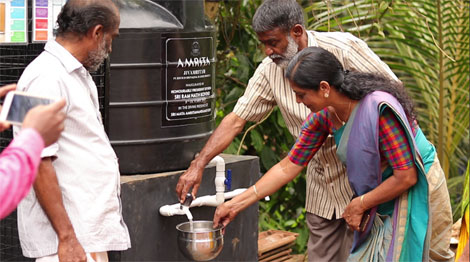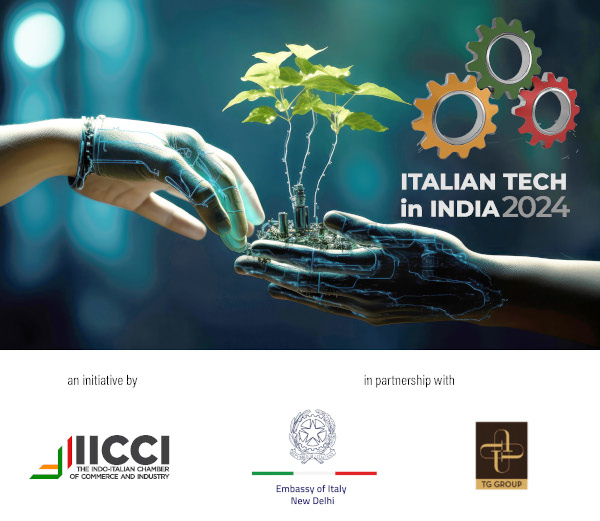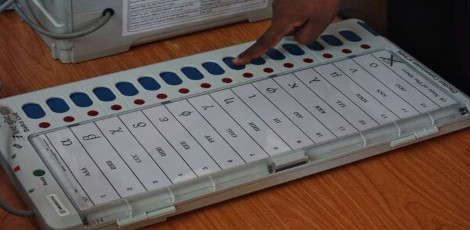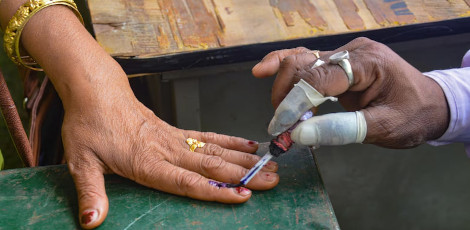No. of views : (1960)
Amrita Vishwa Vidyapeetham - Clean Drinking Water for All
Posted on: 23/Mar/2019 10:53:45 AM

Keeping in line with this year�s World Water Day Theme �Leaving no one behind,� efforts are being made to ensure that clean and safe drinking water is readily made available. For the past few years, Amrita Vishwa Vidyapeetham has taken various steps in this direction.
According to a 2017 study conducted by WHO and UNICEF, �Three in 10 people worldwide (2.1 billion people) lack access to safe and readily available water at home, 844 million do not have a basic drinking-water service, 263 million people spend over 30 minutes per trip collecting water from sources outside the home, and 159 million drink untreated water from surface-water sources, such as streams or lakes.� A UNICEF India study shows that, 67% of Indian households do not treat their drinking water, even though it could be contaminated with harmful bacteria and chemicals.*
Moved by the plight of villagers in India who either lack improved access to water sources or who succumbed to illnesses, even death, due to consuming contaminated drinking water, Sri Mata Amritanandamayi Devi, the Chancellor of Amrita Vishwa Vidyapeetham, made a commitment to increase awareness about the importance of water conservation, improve water-management practices, and develop community-driven technological interventions to improve access to water sources, especially clean drinking water, throughout rural India.
�Over several years, Amrita Vishwa Vidyapeetham has been conducting interdisciplinary research and launching various practical initiatives through the Amrita Self Reliant Villages (ASeRVe) programme and the Live-in-Labs� programme � an experiential initiative designed for students to understand ground-level challenges faced by rural communities and subsequently develop or provide solutions to those challenges. All interventions were designed, developed, and implemented based on a community-driven participatory model that included conducting community-level needs assessments through community participation and fostering community-level capacity building initiatives�. Said Dr Maneesha Sudheer, Dean International Programs Dean, International Programs Director, Amrita Center for Wireless Networks and Applications (AmritaWNA)
For the past four years, Amrita has focused on conducting research, developing innovative and sustainable solutions, and deploying technological interventions. So far, more than 125 research papers have been published along with more than 25 interventions developed to increase water conservation, improve water-distribution and management practices, and water quality and monitoring
A look at some of Amrita�s activities towards water conservation across the country.
Rs 100 crore for the construction of toilets in the poorest villages surrounding the Ganges River, as part of Prime Minister Narendra Modi�s Swachh Bharat and Namami Gange projects � efforts to end the life-threatening diseases affecting millions of Indian citizens stemming from water sources being contaminated by widespread open defecation.
Punarjani River Cleaning Project � adoption of five kms of the Pavana River, crossing the cities of Pimpri-Chinchwad and Pune and cleanup and maintenance starting from Boat Club Thergaon. The e modules include cleaning up the river and rivershore, installing dust bins in the river premises, making compost from water moss, planting trees along the rivershore, painting the walls in that area with quotes to bring awareness about the importance of protecting the environment, awareness campaigns in the societies and institutions on the rivershore, and maintaining the whole area for one year.
Jivamritam Project � Providing filtration for clean drinking water to one crore villagers throughout the nation. The initial phase of the project � which aims to install �Jivamritam� filtration systems for clean drinking water in 5,000 villages throughout the nation � is being completely funded by the Mata Amritanandamayi Math, at an expectant cost of Rs. 100 crore [$15.27 Million U.S.]. Each Jivamritam System is capable of filtering the daily drinking-water needs of up to 400 five-member families. The Jivamritam System was conceptualised and designed by faculty and students of the Math�s five-campus university, Amrita Vishwa Vidyapeetham. So far, a total of more than 200 deployments have been carried out in Kerala, Andhra Pradesh, Uttar Pradesh, Himachal Pradesh and Gujarat.







